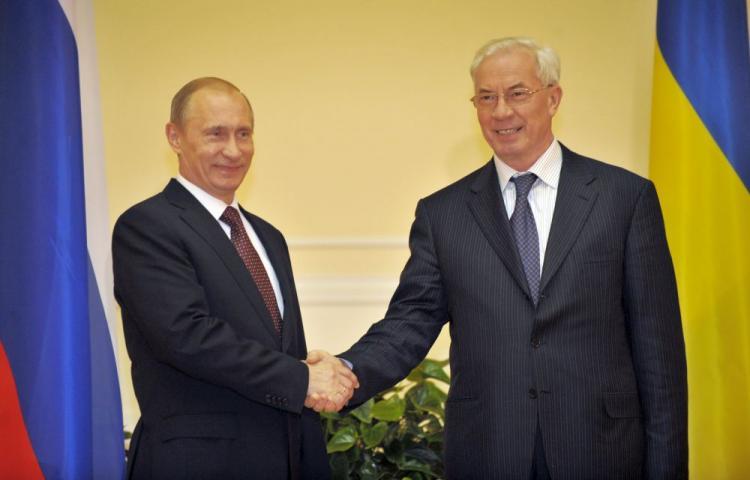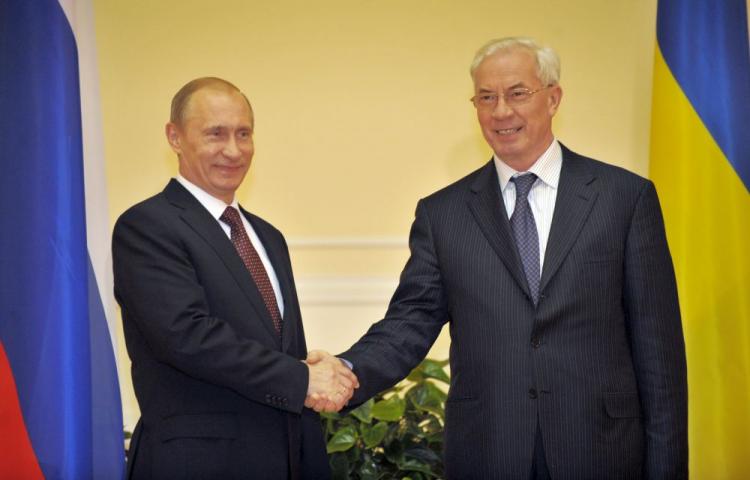UKRAINE—Ties between Russia and Ukraine are improving after years of tension, yet according to analysts these ties may soon be broken by European interest in Ukraine.
Since Victor Yanukovych became the Ukrainian president, ties between Kyiv and Moscow have grown closer and frequent meetings have been held between top officials from both countries. The improved relationship between the two countries is partly attributed to the Russian-leaning policies of Yanukovych.
During meetings held last week, Russian Prime Minister Vladimir Putin proposed an energy cooperation deal to Kyiv that could make Ukraine’s energy partnership with Europe problematic, Polish experts from the Center for Eastern studies in Warsaw conclude.
“Combining energy networks and the parallel operation of transmission systems would mean Ukraine withdrawing from its intentions to join the European networks within the Union for the Coordination of Transmission of Electricity (UCTE),” the report says.
Documents related to the deal indicate that Russia intends to ensure its participation in energy production and distribution, to restrict Ukraine’s opportunities to export energy, and to secure the long-term total dependence of Ukraine on Russian nuclear power—Russian reactors, Russian fuel, and Russia’s participation in uranium exploitation.
The draft of the agreement was released by several Ukrainian media outlets. Analysts say that by signing the deal, Russia will gain more influence in the Commonwealth of Independent States and in Eastern Europe through its use of economic pressure and military presence.
Expensive fuel has been a burden on Ukraine’s ailing economy, making it difficult for the country to pass a budget and resume cooperation with the International Monetary Fund.
Ukraine traded cheaper fuel from Russia in exchange for allowing the Russian navy to maintain a long-term presence in the Crimean Peninsula. The agreement, signed on April 21, will extend the deal until 2042—25 years beyond the original expiration date.
The ratification of the deal in Ukraine’s Parliament was met with heavy resistance from the opposition parties, which resulted in them throwing smoke bombs, eggs, and fists at the other over the attempt to pass the deal.
Although the government is investigating the disorderly conduct in Parliament, lawmakers are not afraid of punishment because of the impunity they have. At least, a few parliamentary factions will pay for the broken system.
Ukraine’s opposition is calling the deal “anti-Ukrainian,” and are saying the pro-Russian President Yanukovych has sold the country’s sovereignty, allowing a Russian “occupation.” The opposition will continue protesting the deal.
Since Victor Yanukovych became the Ukrainian president, ties between Kyiv and Moscow have grown closer and frequent meetings have been held between top officials from both countries. The improved relationship between the two countries is partly attributed to the Russian-leaning policies of Yanukovych.
During meetings held last week, Russian Prime Minister Vladimir Putin proposed an energy cooperation deal to Kyiv that could make Ukraine’s energy partnership with Europe problematic, Polish experts from the Center for Eastern studies in Warsaw conclude.
“Combining energy networks and the parallel operation of transmission systems would mean Ukraine withdrawing from its intentions to join the European networks within the Union for the Coordination of Transmission of Electricity (UCTE),” the report says.
Documents related to the deal indicate that Russia intends to ensure its participation in energy production and distribution, to restrict Ukraine’s opportunities to export energy, and to secure the long-term total dependence of Ukraine on Russian nuclear power—Russian reactors, Russian fuel, and Russia’s participation in uranium exploitation.
The draft of the agreement was released by several Ukrainian media outlets. Analysts say that by signing the deal, Russia will gain more influence in the Commonwealth of Independent States and in Eastern Europe through its use of economic pressure and military presence.
Expensive fuel has been a burden on Ukraine’s ailing economy, making it difficult for the country to pass a budget and resume cooperation with the International Monetary Fund.
Ukraine traded cheaper fuel from Russia in exchange for allowing the Russian navy to maintain a long-term presence in the Crimean Peninsula. The agreement, signed on April 21, will extend the deal until 2042—25 years beyond the original expiration date.
The ratification of the deal in Ukraine’s Parliament was met with heavy resistance from the opposition parties, which resulted in them throwing smoke bombs, eggs, and fists at the other over the attempt to pass the deal.
Although the government is investigating the disorderly conduct in Parliament, lawmakers are not afraid of punishment because of the impunity they have. At least, a few parliamentary factions will pay for the broken system.
Ukraine’s opposition is calling the deal “anti-Ukrainian,” and are saying the pro-Russian President Yanukovych has sold the country’s sovereignty, allowing a Russian “occupation.” The opposition will continue protesting the deal.





